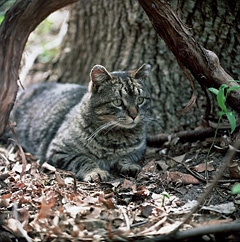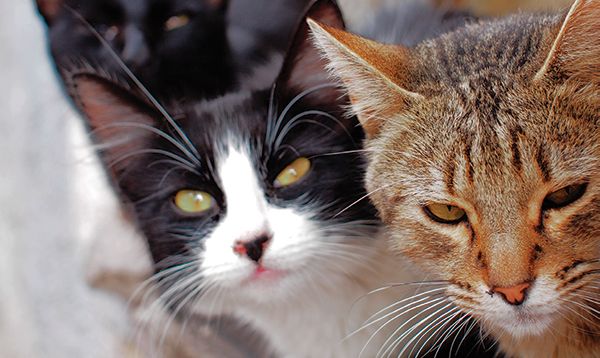Sometimes an issue appears black and white - when it's really a complicated calico, a mix of hues and colors. Cats haven't always had an easy time in Mexico. In many parts of the country, though, their welfare has improved and continues to evolve for the better. But in other places, their situation remains dire. Here's how a few people and organizations are working to make life better for cats in Mexico.
The issues with cats in Mexico
The problem begins with a cultural pet preference, according to Lola Cortina of San Miguel de Allende, where she founded a sanctuary for cats, Santuario Felino Rey Ashoka, a no-kill facility. "People here [in Mexico] prefer dogs," she said.
"Indeed, many people in Mexico have historically treated cats like the very vermin they help to control," said Janice Chatterton, founder of the SPCA in Puerto Vallarta.
Tourists see a part of Cancún but not typically the outskirts where Ricardo Pimentel operates a sanctuary called Tierra de Animales, where, aside from dogs and cats, he saves turtles, goats, sheep or whatever comes along.
Ignorant beliefs about cats
 |
In Puerto Vallarta, cats over populate in lots of places, including a popular park near the Rio Cuale. Local store owners and restaurateurs around the park reportedly pay kids about 10 pesos a piece to kill as many cats as they can.
Dealing with the stigma of helping cats in Mexico
Nancy and David Goldstein are retired snowbirds in Puerto Vallarta, wintering from the Minneapolis/St. Paul area for three months at a time. Nancy said, "Not only do these cats die a horrible death, but I'm worried about the not-so-humane education these children are being taught."
Lola said that sometimes she must maintain a low profile helping cats, or some people might give her a difficult time. People think, "Why bother to help cats?"
However, Mexicans aren't alone. Cats are arguably (in some ways) second-class citizens in the U.S., said Puerto Vallarta resident Suzanna Persa, who some call "the crazy kitten lady."
She said, "Stray cats exist and are sometimes killed in the United States and around the world. This isn't only a Mexican issue. And things are gradually changing for the better here, particularly among younger people."
Suzanna was never involved in animal welfare when she lived in the U.S. However, it was a single little kitten in need of help who touched her heart several years ago after she moved to Puerto Vallarta. "I took that kitten in, and then 3 baby kittens I found in the rain, and the entire kitten thing snowballed."
Suzanna bottle-feeds the kittens and gets them spayed/neutered - usually paying a low cost from her own pocket, as a local veterinarian offers her a discount. And she eventually sends the cats on their way to friends back in the United States or adopts them out locally. "Good work is being done throughout Mexico," she said.
Hope for cats in Mexico
There are local trap-neuter-return programs popping up throughout the country in major metropolitan areas and even in tourist areas like the resort El Dorado Royale in Riviera Maya. Susan Lupe, special projects manager at Karisma Hotels & Resorts said, "We TNR the cats that somehow get on to the property. We feel it's our responsibility. We try to find homes for (social) cats. If we are unable to, the (TNRd) cats even have cat casitas (little homes) where they can rest, and they get food and water."
 |
In March, Pause4Paws took 74 cats trapped in Puerto Vallarta, had them spayed/neutered and vaccinated for rabies and sent them flying the friendly skies to Minnesota in a program called Gotta Getta Gato. Several local welfare groups participated in this massive effort. Immediately upon arrival in the U.S., the cats were vet checked for potential infectious disease and/or parasites. At press time, some cats were adopted, while others enjoyed time with their foster families.
A society that still harbors fears and superstitions about cats
Susan said that when she first relocated to Playa del Carmen 10 years ago, many people were afraid of cats. "They believed cats would inhale their last breath."
Lola said that some doctors tell women that having a cat will make them sterile, and obstetricians tell pregnant women to give up their cats without educating them on how to avoid the transmission of toxoplasmosis (which can cause birth defects). "There's even a belief that if you sleep with a cat you can get eye cancer, or if you are stared at by a cat your soul will be stolen," said Lola, who regularly appears on local radio informing cat owners about needed veterinary care, behavior issues and busting myths along the way. "Education is changing this, particularly with younger people."
Education and awareness about cats in Mexico
Lola allows her cats outside, understanding the various hazards outdoors but noting that her cats enjoy being outside. But in larger cities like Mexico City or Leon, Dr. Cesar Morales, director of the Veterinary Congress de Leon said, "Now you can see sales of litter boxes and cat litter for indoor-only cats. And people are being educated to offer behavior remedies, which in the past were only available for dogs."
Of course, most indoor-only cats are spayed/neutered. The secret to population control is spay/neuter – and that remains a challenge, both for cultural reasons and costs. Increasingly, there are no-cost and low-cost options available. And culture is changing, though that doesn't occur overnight.
Dr. Morales said that in Leon, for every three cats seeing a veterinarian, there are seven dogs. These numbers aren't all that different than the U.S. However, Morales added that cat caretakers in Leon actually are willing to spend far more on felines compared to canines, and that's not the case in the U.S. "For many young couples, cats are the new dog," Dr. Morales added.
In places like Puerto Vallarta, Miguel de Allende, Playa del Carmen or Cancun, Susan, who is from Texas, said that the increasing population of Americans and Canadians has made a huge difference, infusing awareness and dollars for spay/neuter and animal welfare education programs.
Suzanna added, "In the end, Mexico is a large country with a lot of people who simply have little education or resources. But the good news is that cat welfare is gradually changing. If cats can be considered real members of the family, they will be cared for – because in this culture, family is where it's at."
Original article by Steve Dale, a certified animal behavior consultant who's authored several books, including the e-book Good Cat, and has contributed to many, including The Cat: Clinical Medicine and Management, edited by Dr. Susan Little. He hosts two national radio shows and is heard on WGN Radio, Chicago, and seen on syndicated HouseSmartsTV. He's on the board of the American Association of Human-Animal Bond Veterinarians and Winn Feline Foundation. Visit him at stevedale.tv.


